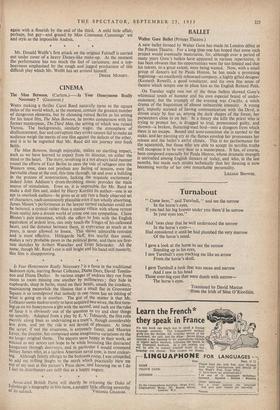CINEMA
The Man Between. (Carlton.) -Is Your Honeymoon Really Necessary ? (Gaumont.) WHEN making a thriller Carol Reed naturally turns to the square miles of the world which, at the moment, contain the greatest number of dangerous elements, but by choosing ruined Berlin as his setting for his latest film, The Man Between, he invites comparison with his former masterpiece, The.Third Man, the setting of which was ruined Vienna. The backgrounds, similarly tragic, the atmosphere of disillusionment, fear and corruption they evoke cannot fail to make an audience weigh the merits of one film against the defects of the other, and it is to be regretted that Mr. Reed did not journey into fresh fields.
The Man Between, though enjoyable, makes no startling impact, such as we have learned to expect from its director, on either the mind or the heart. The story, revolving in a not always lucid manner round the efforts of East Berlin to stem the tide of refugees into the Western zone, does not produce any feeling of tension, even the inevitable chase at the end, this time through, up and over a building in the process of construction, lacking the requisite excitement ; indeed John Addison's drum-throbbing music provides the main source of stimulation. Even so, it is impossible for Mr. Reed to make a dull film and, aided by Harry Kumitz its author—one is so apt to aGerlook authors—he gives us at any rate a finely observed set of characters, each consistently plausible even if not wholly absorbing. tames Mason's performance as the lawyer turned racketeer could not be bettered, a cynical rather than a sinister villain with whose retreat from reality into a dream world of crime one can sympathise. Claire Bloom's pale innocence, which she offers to him with the English equivalent of ardent love, can only touch the fringes of his calloused heart, and the distance between them, in experience as much as in years, is never allowed to lessen. This shows admirable restraint and is most effective. Hildegarde Neff, less tearful than usual, makes a very probable pawn in the political game, and there are first- rate sketches by Aribert Waescher and Ernst Schroeder. All the same, though Mr. Reed's eye is still bright and his hand still masterly, this film is disappointing.
* * *
Is Your Honeymoon Really Necessary? is a farce in the traditional bedroom style, starring Bonar Colleano, Diana Dors, David Tomlin- son and Diana Decker. In various stages of undress they run from room to room missing one another by millimetres ; they hide in cupboards, sleep in baths, stand on their heads, smash the crockery, maintaining meanwhile the illusion that a small flat in Grosvenor Square is so soundproof that nobody in one room has an inkling of what is going on in another. The gist of the matter is that Mr. Colleano seems inadvertently to have acquired two wives, the first turn- ing up on his honeymoon night with the second, and such are the rules of farce it is obviously out of the question to try and clear things up sensibly. Adapted from a play by E. V. Tidmarsh, the film rolls Merrily along lines as undeviating as a tram's, though considerably less prim, and yet the ride is not devoid of pleasure. At times the script, if not the situations, is extremely funny, and Maurice Levey, the director, has composed some imaginative variations on the no longer original theme. The players seem happy in their work, as relaxed as any actors can hope to be while bounding like distracted kangaroos through doorways, and in particular I would commend Sidney James who, as a tactless American naval type, is most endear- ing. Although faintly allergic to the bedroom romp, I was compelled to add my trilling laughs to the mirth which practically blew me Out of my seat at this picture's Press show, and knowing me as I do I feel its distributors can Wit this as a happy augury.
Assocated British Paths will shortly be releasing the Duke of Edinburgh 's biography in film form, a scrappy little offering unworthy


































 Previous page
Previous page